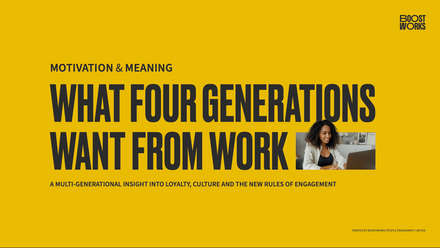Everyday appreciation: How to build a culture of recognition

A simple “thank you” or act of recognition can mean so much, especially during challenging times. Not only can it make a huge difference to an individuals’ morale, confidence, motivation levels and overall wellbeing, but it can improve your business’ performance. In fact, according to the 2011 WorkForce Mood Tracker, 69% of employees say that they’d work harder if they felt their efforts were better recognised. On top of that, Gallup found that employees who don’t feel adequately recognised are twice as likely to say they’ll quit in the next year.
Whether it’s a small token of gratitude or a simple message of thanks, showing your employees that they’re valued will go a long way. But for your business and your employees to really feel the benefit of recognition, it needs to be a key part of your culture and ideally something that happens every single day.
How to create a culture of recognition
Building a culture of recognition doesn’t happen overnight. It takes a lot more than just deciding to deliver gifts to your employees and taking the time to say “thank you” more often. To truly make recognition part of your culture you need to be strategic and create a reward and recognition programme that delivers value to your business, your people and will contribute to your business’ goals.
Consider how you can utilise recognition to complement your culture. What specific milestones, achievements, and behaviours do you want to celebrate? Here are some types of recognition and rewards to consider:
- long Service Awards/work anniversaries
- performance-based rewards/sales incentives
- peer-to-peer recognition
- new starter/onboarding recognition
- life event recognition e.g. birthdays.
Whether you want to drive motivation and performance or enhance collaboration and teamwork, there are plenty of ways to recognise your employees in a way that’ll correlate with your goals. Once you’ve established the fundamental strategy behind your reward and recognition programme, you can then work on the finer details of delivering it to your employees through a robust platform.
Incorporate your values
An effective way to align recognition to your culture is to incorporate your company values. Your business’ values represent the types of behaviour you want your employees to demonstrate in their day-to-day actions. You can therefore use your values as a behavioural framework, and reward or recognise employees whenever they display them.
Many of the businesses we work with incorporate their values into their peer-to-peer recognition programme as it’s such a powerful way of reinforcing them day-to-day. This means that when an employee wants to recognise a colleague, they have to select a value that best reflects the action or achievement of the recipient.
The benefit of connecting an action or achievement to a value is that employees see regular examples of what it looks like to demonstrate a value. This means that they’ll not only be more likely to emulate this positive behaviour in their own roles, but will also look out for instances where they can recognise their colleagues for doing it too. As a result, recognition plays a huge part in shaping your employees’ behaviour to reflect your culture.
Deliver frequent and timely recognition
Consistency is key to establishing a strong culture of recognition. This means that you need to deliver rewards and recognition as and when your employees reach certain milestones or targets. The longer the delay, the less of an impact the recognition will have. By recognising individuals and teams in the moment, you’re capitalising on an already positive moment and will therefore encourage your employees to keep up the great work.
One of the big advantages of implementing a reward and recognition platform is that you can easily automate certain areas of recognition. For example, with long service awards or birthday awards, you can work with your provider to deliver these automatically, based on employee data. This means you don’t have to worry about missing any important milestones and your employees can enjoy a special token of recognition in the moment.
There will be cases where automation isn’t possible, but having a platform makes it easy to deliver rewards and recognition in a timely manner. It’s just a case of making sure that your managers understand the importance of acting quickly whenever an appropriate moment arises to deliver a reward or send a message of recognition.
Encourage employees to recognise each other
Everyone in your business has a part to play in building a culture of recognition, so it’s important to involve your employees in the process. Peer-to-peer recognition empowers your employees to share their appreciation of their colleagues whenever they see fit. From receiving great feedback from a customer to completing a challenging project, your employees can capture these positive moments and give their teammates a well-deserved pat on the back.
Encouraging your employees to recognise each other’s achievements will help build a positive, collaborative working environment where appreciation is part of everyday life. Peer-to-peer recognition tools make it easy for your employees to send thank you messages to each other. The key challenge is making sure your employees are using the tool effectively.
Make recognition visible across your business
A valuable way to inspire your employees to recognise each other and amplify the significance of recognition to your workforce, is to make it visible to your whole business. While a personal message of gratitude from one person to another is valuable and important in certain contexts, recognition that is visible company-wide will have more impact.
First and foremost, seeing colleagues receive recognition will boost your employees’ motivation. But besides that, it will also inspire them to share their appreciation of their colleagues too. This is crucial to creating a culture of recognition because, as we mentioned before, it’s all about getting your employees on board and involved in the process. The more your employees recognise and appreciate each other, the more it’ll be part of your culture and everyday practices. It’ll just be something people know to do as and when positive things happen.
Creating a culture of recognition is a long process that requires continual work. On the surface, it’s all about making recognition part of everyday life in your business, which is where peer-to-peer recognition is a valuable tool. But on a deeper level, for recognition to be truly aligned to your culture, you need to tailor your approach to suit your business’ unique values and goals.
This article is provided by peoplevalue – ‘The Employee Engagement Company’.
Supplied by REBA Associate Member, peoplevalue – The Employee Engagement Company
We are a leading provider of employee reward&recognition, benefits delivery&wellbeing solutions.







